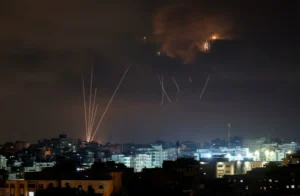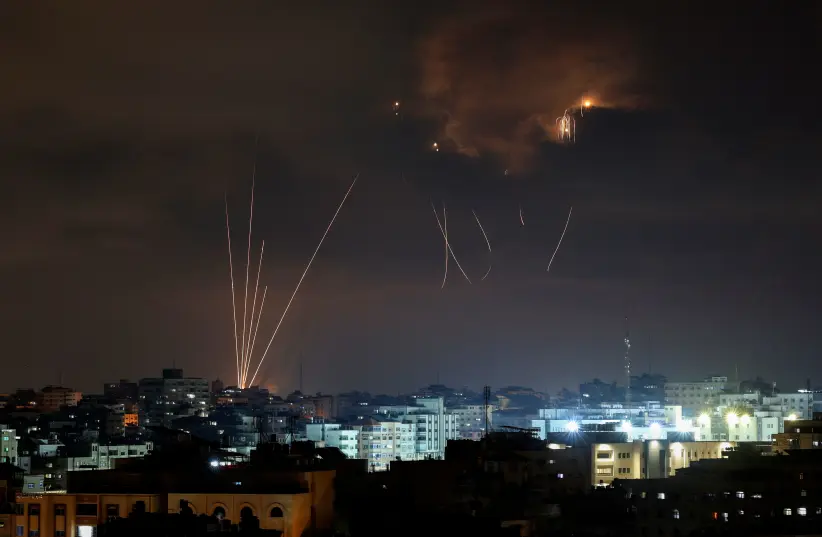Israel did not agree to release the Palestinian Islamic Jihad senior member Bassam al-Saadi as part of the ceasefire talks to end Operation Breaking Dawn.

Israel did not agree to release Palestinian Islamic Jihad prisoners as part of ceasefire talks to end Operation Breaking Dawn, a senior Israeli diplomatic source said on Sunday, hours after the hostilities ended.
Before the ceasefire went into effect at 11:30 p.m. Sunday, Islamic Jihad announced that Israel would release one of the terrorist group’s senior members Bassam al-Saadi, who was arrested last week, as soon as possible, as well as administrative detainee Khalil Awawda, to transfer him for medical treatment. Egyptian state media also said that Cairo would work to that end.
“Israel did not agree to release any of the prisoners,” the senior source said. “The Egyptians asked, and we will allow a dialogue on the situation of the prisoners,” meaning how they are faring from a humanitarian perspective.
The senior Israeli source said that Israel has a “diplomatic opportunity” following Operation Breaking Dawn and that Israel wants to leverage recent messages from Hamas about Israeli captives.
Hamas has been holding Israelis Hisham al-Sayed and Abera Mengistu in captivity, as well as the bodies of soldiers Hadar Goldin and Oron Shaul. In recent weeks, Hamas released a video clip it says shows al-Sayed in poor health.

“We want to take this forward and not just be satisfied with a quiet Islamic Jihad,” he said. “The captives are a high priority for Prime Minister [Yair] Lapid. We are acting to exhaust every opportunity to deal with this humanitarian matter.”
“Israel did not agree to release any of the prisoners.”
Senior Israeli diplomatic source
Gaza remains delicate, the source said, with 2 million residents with a “complex economic situation” that could boil over at any time.
Israeli actions in the past year to improve the economic situation, such as allowing more Palestinian workers from Gaza into Israel, contributed to stability and to Hamas staying out of the latest round of fighting, according to the source.
Looking at the outset of the Gaza operation, which began on Friday, the source in Jerusalem said that “we did not enter it by choice.”
IDF commanders in Gaza and in Judea and Samaria identified an escalation in Islamic Jihad activities two weeks ago.
“When we made the arrest [of al-Saadi] in Judea and Samaria, we did not know that it would be the toothpick that would ignite a fire,” the source admitted.
The ceasefire
Lapid and Defense Minister Benny Gantz first sought ways to deescalate, the source said, and as such, were in contact with Egypt, which in turn talked to Hamas, to lower the level of tensions. In that way, ceasefire talks started before Operation Breaking Dawn even began, and continued throughout.
Though Israel did not want to enter into an operation in Gaza, “we couldn’t keep the envelope in [a lockdown] situation, but we couldn’t ignore Islamic Jihad’s intention to shoot.”
Israel was intent on keeping the operation focused on Islamic Jihad, without drawing Hamas into it, and therefore only sought to start it when there was an “operational opportunity” or the chance to stop a terrorist attack – which turned out to be when Israel killed top Islamic Jihad commander Tayseer al-Jabari on Friday.
Jerusalem thought it was highly likely that Hamas would not want to join the fighting, but still prepared for that possibility, noting that the terrorist group controlling Gaza did not exercise its authority and control to stop Islamic Jihad from attacking, the source said.
Lapid emphasized the importance of constant communication with parties abroad, whether Egypt and Qatar who were involved in ceasefire talks or the international community more broadly, especially the US, the senior diplomatic source said. Israel communicated to all parties that it is seeking to have as narrow an operation as possible.
US President Joe Biden’s statement on the end of the fighting shows the level of support from Washington, the source said.
Biden welcomed the ceasefire on Sunday night, and said his “support for Israel’s security is long-standing and unwavering—including its right to defend itself against attacks. Over these recent days, Israel has defended its people from indiscriminate rocket attacks launched by the terrorist group Palestinian Islamic Jihad, and the United States is proud of our support for Israel’s Iron-Dome, which intercepted hundreds of rockets and saved countless lives.”
The US president also “commended Prime Minister Yair Lapid and his government’s steady leadership throughout the crisis.”
Egypt began negotiating intensively for a ceasefire on Saturday and was the dominant party in those talks. Jordan played a key role in ensuring there was no violence on the Temple Mount on Sunday, on which Jews marked Tisha B’Av, mourning the destruction of the two Temples at that site.
Israel considered a humanitarian ceasefire on Saturday night, to take place Sunday morning, the source said, which would allow diesel fuel into Gaza so there would be more hours of electricity for its residents. However, when Islamic Jihad shot a rocket toward Jerusalem the following day, Israel said it would have to be a full ceasefire or nothing.
Israel expected a full ceasefire on Sunday afternoon already, but Islamic Jihad continued making demands.
Within Israel, the source said that Lapid, Gantz and other relevant arms of government were very synchronized, allowing for smoother work. Alternate Prime Minister Naftali Bennett took part in a number of key meetings during the operation.

